As a millennial who grew up watching Disney films as a feel-good treat and family bonding experience, I now have the privilege of revisiting these stories while introducing my child to their live action remakes. I must say that I appreciate them even more now as a mom because they are surely beyond catchy songs and loveable characters: they subtly teach their audience about healing generational trauma.
Old and new Disney films help me in my strong desire to prevent generational trauma from becoming part of my parenting style and family narrative. In this article, I share with you the lessons I learned and relearned from them.


Thinking that it was the best way to keep their daughters safe, Elsa and Anna’s parents forcedly separated them and kept their identities secret from each other. As a result, even if they are sisters, Elsa and Anna lack knowledge and understanding about Elsa’s abilities.
Trauma grows when kept in secret and multiplied by guilt and shame. How often have I felt ashamed to let others know about what I’m going through because I feel like it’s all my fault? It takes a bit of courage to ask and / or educate ourselves through research to discover the hidden traumas we might be carrying. This is important so we can understand ourselves better and let go of the stigma of talking to others about our internal struggles.

In order to show a strong and united front, Encanto’s Madrigal family matriarch insisted that they bury their traumatic past experiences and never show weakness because they had so many people counting on them and their special gifts.
We live in a culture that values silent suffering and deflecting deeper conversations with humor. I certainly find myself uncomfortable when I have to be emotionally vulnerable even to people that I care about most. But like the magical Casita, it’s through open communication with our family and friends that we can start to mend the cracks and heal our hurts.
No one would forget the hit song, “We don’t talk about Bruno.” In reality, we really should – whatever “Bruno” means for us and our families.

Moana struggled to understand her father’s anger about her wanting to go beyond the reef until her mother shared that Moana’s father had once done the same thing and it ended in tragedy.
When emotions get the better of us, it can be difficult for us to express ourselves rationally. Taking the time to examine the things that evoke strong emotional reactions from us and understanding why we react in certain ways can help us prepare to cope with these feelings instead of letting them overwhelm us.

The Lion King’s Simba runs away from their kingdom when he is made to believe that his father’s death is his fault. Timon, Pumba, and Nala help him survive outside of and eventually return to the kingdom to claim the throne.
Some of us believe that it is more noble to isolate and keep all our problems to ourselves, but the truth is, a problem shared is a problem halved. When we get support from family and friends, it doesn’t mean we are asking them to solve things for us. The very act of sharing our worries with our loved ones can already decrease the burden on our mental health.

Rapunzel only wanted to go and see the floating lanterns on her birthday but was guilted into staying in her tower instead.
I often struggle with guilt when I make a conscious effort to do something that’s just for myself, but it really helps me to recharge and get a better perspective of my current situation. Making time to do things that improve our physical, mental, and emotional well-being is important, whether that’s going to the gym or going on a secret adventure to watch floating lanterns.
Like Rapunzel, we can also benefit from stepping away from a situation for a while in order to take care of our own needs.

In Coco, Miguel’s family continued the practice of banning all music from their home and they viewed all musicians as villains, carrying this practice from one generation to the next. Miguel made the choice to fight the status quo and break the cycle.
We can do the same in our own families. Parenting comes with no instruction manual or orientation workshop, so we tend to fall back on what we know and what is familiar. We can take time to examine the practices and beliefs we grew up with and choose only the ones that we believe will be good for our children and the generations after them.
Real life is rarely like our favorite Disney stories. There are fewer spontaneous song numbers, we rarely find cute talking animal sidekicks, and trauma isn’t always resolved in such clear and definitive ways. But if we keep in mind the lessons we learn from these books and films, we can do more to make sure that the traumatic experiences of the past don’t color how we raise our children.
I want to teach my child that the real world is also a place full of colorful scenery and beautiful songs where dreams can come true. I want her to grow up knowing that no matter how sad or scared she might feel, she will always have the unconditional love and support of deeply flawed parents who strive every day to make the world and our own selves a little bit better for her.



